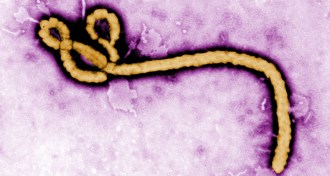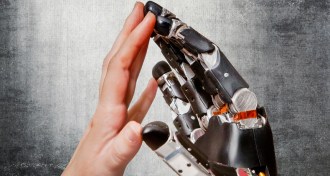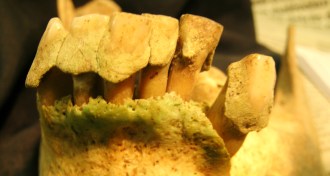Humans
Sign up for our newsletter
We summarize the week's scientific breakthroughs every Thursday.
-
 Health & Medicine
Health & MedicineHopes raised for Ebola treatment
Most monkeys given dual therapy survive infection with lethal virus.
By Nathan Seppa -
 Health & Medicine
Health & MedicineAudio therapy may avert chemo-induced hearing loss
Mice exposed to loud sound before getting chemotherapy preserve valuable cells in the inner ear, a new study shows.
By Nathan Seppa -
 Health & Medicine
Health & MedicineElectrodes dupe brain into feeling touch
Stimulating the right neuron at the right time gave monkeys the sensation of contact.
-
 Science & Society
Science & SocietyScarcity
Sendhil Mullainathan and Eldar Shafir explain why having too little means so much.
By Nathan Seppa -
 Anthropology
AnthropologyNeandertals ate stomach goop, and you can too
Eating partially digested stomach contents, or chyme, has long been a nutritional boost.
-

-
 Health & Medicine
Health & MedicineElusive baby sleep miracles remain elusive
There is little evidence to support sleep-training interventions for babies younger than six months. Sorry, sleep-deprived parents.
-
 Anthropology
AnthropologyAncient farmers, foragers kept genes to themselves
Ancient DNA and diet clues suggest how farmers and hunter-gathers contributed to modern Europeans’ genetic profiles.
By Bruce Bower -
 Health & Medicine
Health & MedicineHighlights from annual meeting of infectious disease specialists
Heartburn pills increase risk of pneumonia, a better catheter and more were presented October 2-6, 2013 at ID Week in San Francisco.
By Nathan Seppa -
 Health & Medicine
Health & MedicineOld drug may have new trick
Parkinson’s medication helps mice with condition that mimics MS.
By Nathan Seppa -
 Health & Medicine
Health & Medicine‘Decoding Annie Parker’ portrays hunt for breast cancer genes
Not long ago, most doctors scoffed at the idea of a “cancer gene,” as the new film shows.
-
 Health & Medicine
Health & MedicineNorovirus vaccine shows early progress
Individuals immunized against Norwalk virus and another norovirus experienced less vomiting and diarrhea than those who didn't receive shots.
By Nathan Seppa